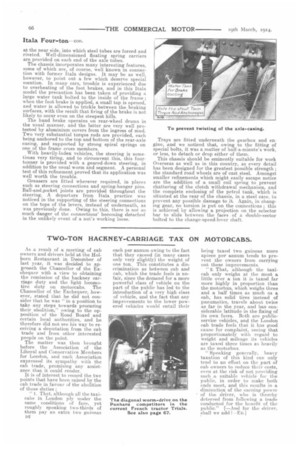TWO – TON HACKNEY – CARRIAGE TAX ON MOTORCABS.
Page 16

If you've noticed an error in this article please click here to report it so we can fix it.
As a result of a meeting of cab owners and drivers held at the Holborn Restaurant in December of last year, it was decided to approach the Chancellor of the Exchequer with a view to obtaining the remission of the hackney carriage duty and the light locomotive duty on motorcabs. The Chancellor of the Exchequer, however, stated that he did not consider that he was "in a position. to take any steps towards procuring their abolition," owing to the opposition of the Road Board and certain local authorities, and he therefore did not see his way to receiving a deputation from the cab trade and from other interested people on the point.
The matter was then brought before the Association of the Liberal and Conservative Members for London, and each Association expressed its sympathy with the cab trade, promising any assistance that it could render.
It is of interest to record the two points that have been raised by the cab trade in favour f the abolition of these duties ; "1. That, although all the taxicabs in London ply under the same conditions of fare, yet roughly speaking two-thirds of them pay an extra two guineas D2
each per annum owing to the fact that they exceed (in many cases only very slightly) the weight of one ton. This constitutes a dis. crimination as between cab and cab, which the trade feels is unfair, since the demand for a more powerful class of vehicle on the part of the public has led to the introduction of a very high class of vehicle, and the fact that any improvements to the lower powered vehicles would entail their
being taxed two guineas more apiece per annum tends to prevent the owners from carrying out these improvements.
"2. That, although the taxicab only weighs at the most a little over a ton it is taxed far more highly in proportion than the motorbus which weighs three and a half times as much as a cab, has solid tires instead of pneumatics, travels about twice as far in the year, and has considerable latitude in the fixing of its own fares. Both are publicservioe vehicles, and the London cab trade feels that it has good cause for complaint, seeing that proportionately with regard to weight and mileage its vehicles are taxed three times as heavily as the motorbus.
"Speaking generally, heavy taxation of this kind eau only tend to an effort on the .part of cab owners to reduce their costs, even at the risk of not providing such a suitable vehicle for the public, in order to make both ends meet, and this results in a diminution of the earning power of the driver, who is thereby deterred from following a trade conducted for the benefit of the public." 1--And for the driver, shall we add ?—En.]


























